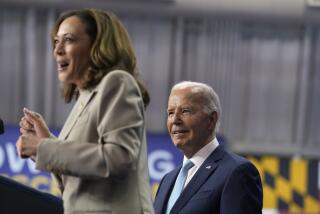Clinton Tries to Beef Up Faltering Cattle Market
- Share via
WASHINGTON — With election-year cattle prices tumbling to 10-year lows, President Clinton sent the government into the cattle market Tuesday to bail out ranchers.
He directed the Agriculture Department to accelerate purchases of $50 million worth of beef for school lunches, told the department to open up environmentally sensitive Forest Service federal land for grazing and held out the possibility of additional steps, including credit guarantees to expand American beef exports.
The measures were announced one day after the president ordered the sale of 12 million gallons of government-owned oil in an effort to curb rising gasoline prices.
The cattle measures are likely to have neither a significant impact on prices for beef on supermarket shelves nor will they cost the U.S. Treasury any money. But they do provide assistance to ranchers who make up a significant economic and political group in a broad swath from Illinois and Texas to Montana and California.
“We have to act quickly. We can’t fool around,” Clinton said at the start of a meeting with members of Congress from ranching states.
Analysts questioned whether the steps will have much effect.
Even Secretary of Agriculture Dan Glickman said that he did not think the purchases under the school lunch program would turn around prices paid for cattle. But, he said, ‘I think it is a good psychological boost out there in the market.”
“These are mostly public relations,” said Daniel Sumner, a professor of agriculture economics at UC Davis and an assistant secretary of agriculture in the Bush administration. “People are saying Agriculture should do something, so they try to do something. They’re not buying more beef. They’re just fiddling with the timing.”
Still, the move places the White House in a sensitive position because it suggests that Clinton is taking steps to help one sector of the economy at the potential expense of consumers when food on all grocery shelves is beginning to cost more. Some economists are predicting that market basket increases will climb as much as 2.5% this year.
“This is a very important issue, and there are, you know, hundreds of thousands of families whose livelihoods depend on cattle ranching,” White House Press Secretary Mike McCurry said.
He emphasized that, in the wake of the oil decision and the president’s consideration of the cattle measures, “we have no intent and no interest in intervening in commodity markets. We believe that markets work best in resolving supply and demand situations,” he said.
The drop in cattle prices has followed weather-driven record high prices for grain fed to cattle to fatten them for slaughter. Cattle most recently were bringing 56.85 cents per pound, compared with prices as high as 77 cents a pound three years ago.
By speeding up the government’s limited beef purchases, Clinton is moving to reduce the supply of beef, a move that could inch up prices paid to cattle raisers.
The president’s decision to make more public land available for use by ranchers will lower the cost of grazing and thus dampen the impact of lower sale prices for the cattle. The fragile public acreage had been set aside to protect it from the ravages of erosion that can follow when livestock devour its vegetation.
“Cattlemen believe it will help them to hold steady on the prices of cattle in this year’s herd,” said Elliot Bercovitz, vice president for strategic planning in the Chicago-based futures firm of Lind-Waldock. “This is an attempt to stabilize prices by creating a demand.”
More to Read
Sign up for Essential California
The most important California stories and recommendations in your inbox every morning.
You may occasionally receive promotional content from the Los Angeles Times.













